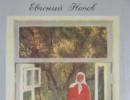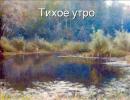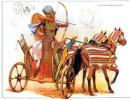What problems are described in the story Quiet Morning. Analyzing works
1) Features of the genre of the work. The work of Yu. P. Kazakov belongs to the short story genre.
2) Theme and problems of the story. A problem is a question posed by the author on the pages of a work of fiction. Problematics – a set of problems considered in a work of art.
– What problems does Yu. P. Kazakov address in his story “Quiet Morning? (conscience, duty, love for one’s neighbor, love for nature, etc.) Explain your idea.
– How does the writer try to solve the problem of the boys’ relationships with each other?
(the writer prepared a difficult test for his heroes)
3) Features of the plot of the work. The description of the events that happened to the boys unfolds against the backdrop of nature.
– How “Quiet Morning” begins its story. Yu. P. Kazakov? (from a description of early morning and fog that almost completely covered the village)
4) Characteristics of the characters in the story. In the story “Quiet Morning” by Yuri Kazakov, two boys are depicted as the main characters: a city dweller, Volodya, and a simple village boy, Yashka.
(see characteristics of heroes)
5) Artistic features of the story.
– Find synonyms in the text of the story
by the way, fog, (large duvet, stingy owner)
– Find one of the descriptions of nature (description of morning, fog, river). Determine its role in the text of a work of art. (Nature in this work is not the usual background against which the main plot twists and turns unfold. The landscape helps the writer reveal the psychological state of the characters and convey their emotional experiences. The village boy Yashka got up very early to prepare for fishing with his city friend Volodya. Narration in the story begins with a description of the fog that enveloped the entire village early in the morning: "The village, like a big duvet, was covered with fog. The nearby houses were still visible, the distant ones were barely visible as dark spots, and even further, towards the river, nothing was visible and, it seemed as if there had never been a windmill on the hill, no fire tower, no school, no forest on the horizon..." Thanks to the comparisons and metaphors used, the reader imagines the picture opening up before him. The spreading fog is a kind of impersonal hero of the story: he then retreats in front of the boys, going fishing, “discovering more and more houses, and barns, and a school, and long rows of milky-white farm buildings,” then “like a stingy owner” shows it all only for a minute and then closes in from behind again. The pool of the river where the boys came to fish warns the boys of their danger. To describe it, the writer uses the following epithets and comparisons: “it poured into deep dark pools,” “rare heavy splashes were heard in the pools,” “it smelled of dampness, clay and mud, the water was black,” “it was damp, gloomy and cold.” Nature seems to warn the boys about the impending danger, but Yashka and Volodya do not see this warning, their desire to start fishing as soon as possible is too great. The serene landscape contrasts with the terrible events that happened to the boys while fishing, when Volodya almost died, so the phrase is constantly repeated in the story: “the sun was shining brightly, and the leaves of the bushes and willows were shining... everything was the same as always, everything breathed peace and silence, and a quiet morning stood over the earth...”, but Yashka, who saw Volodya drowning, was restless in his soul, therefore, having gathered all his strength, Yashka came to his friend’s aid and saved him from imminent death. So, nature in Yu. P. Kazakov’s story “Quiet Morning” helps to reveal the inner experiences of the characters and convey their feelings.)
– For what purpose does the author describe the village? (to convey the feelings and moods of the characters; the village in the pre-dawn hour is extraordinary)
– Explain the meaning of the title of Yu. P. Kazakov’s story “Quiet Morning”? (The very title of Yuri Pavlovich Kazakov’s story “Quiet Morning” captures one of the natural phenomena. Indeed, the entire action of the work takes place in the early summer morning. But this name was not given by the writer in order to accurately determine the time of action. The silence of the morning allows Yuri Kazakov to see the beauty of nature, and also highlights the climactic event that happened to the main characters of the story while fishing. “Quiet Morning” - the contrast between nature and the trials that befell the boys is emphasized.)
– Explain the features of the story’s ending (the ending gives a description of nature, which evokes a joyful, bright feeling in the reader; nature itself is happy about such a favorable ending to the story)
(No ratings yet)
Other works on this topic:
- Yuri Pavlovich Kazakov is a prose writer of the second half of the twentieth century. The writer has a special ability: to write about typical things, but to characterize them from an unusual side. In the story...
- The genre of the work is a psychological story. There are two heroes - the village resident Yashka and his new acquaintance, who came from Moscow to stay, Volodya. The basis of the plot is the behavior of two...
- Analysis of the work The genre of the work is a psychological story. There are two heroes - the village resident Yashka and his new acquaintance, who came from Moscow to stay, Volodya. The basis of the plot is...
- The story by Yu. P. Kazakov “Quiet Morning” is intended for both young and adult readers, because at the center of the story is the child’s overcoming not at all...
- Literary analysis. Yu. P. Kazakov’s story “Quiet Morning” is intended for both young and adult readers, because the center of the story is the child’s overcoming...
- Retelling plan 1. Yashka wakes up very early to go fishing. 2. Yashka wakes up Volodya and begins to bully him. 3. The guys go to the river. They...
Brief retelling of the work
On this quiet morning, Yashka got up very early, dug up worms and went to wake up Muscovite Volodya, whom he promised to take fishing. Volodya annoyed Yashka with the question: “Isn’t it early?” and the way he put on his shoes. On the way, they drank from clean well water. And this reconciled them.
Yashka tells Volodya about fish, birds, and octopuses. Finally, they reached the river. Yashka brought Volodya to the pool, where, in his opinion, there was a good bite. The first time a fish fell off Yashkin's hook.
Another time he pulled out a big bream. Volodya ran up to him, leaving his fishing rod behind. A fishing rod with a lump of earth was pulled into the river. Volodya rushed after her, stumbled and fell into the pool. Not knowing how to swim, he choked and began to drown. Yashka was scared. He had already started to run. But, realizing that no one but himself would help Volodya, he returned.
It took a lot of effort for Yashka to pull Volodya out and bring him to his senses. After that he burst into tears. And he felt very sorry for Volodya. And the sun was shining, and a new bright day began.
Characteristics of the main characters:
Yashka is an avid fisherman, grew up in the village, loves and understands his native nature, and in a moment of danger finds the strength to overcome fear and save his comrade.
Volodya is a city boy, he saw how they fish only in the Moscow River, he gets lost in a critical situation and almost dies.
Topic: “About the unusual fishing of two boys early on a quiet morning.”
Impression of the book: this story is very instructive. There can be different challenges in life. It is so important not to be a coward. In an extreme situation, Yashka became the winner, although it cost him considerable mental and physical strength.
Updated: 2017-12-06
Attention!
Thank you for your attention.
If you notice an error or typo, highlight the text and click Ctrl+Enter.
By doing so, you will provide invaluable benefit to the project and other readers.
Useful material on the topic
>Essays on the work Quiet Morning
Description of Yashka and Volodya
Yu. P. Kazakov’s story “Quiet Morning” is about true friendship and mutual assistance. It talks about life in the countryside and the difference between rural and urban people. The main characters of the story are Yashka and Volodya. Yashka is a typical village boy who always walks around with bare feet and dirty hands. Old pants and a shirt are all his clothes. He is straightforward and a bit harsh by nature. In the village he is considered the best among the boys in fishing. Volodya is a boy from Moscow. This is a typical city dweller, a little pampered and impractical. He is softer and more compliant.
Volodya had never been fishing, but he really dreamed about it. Knowing this, Yashka got up early one morning while the whole village was sleeping, dug up some worms and went after Volodya. At first Volodya didn’t want to get up so early, but for the sake of fishing he agreed. When he began to pull on his shoes, Yashka began to mock him, because their entire village walked barefoot. Volodya did not like these taunts, but for the sake of fishing he endured it. On the way they started talking. They talked mainly about fishing and hunting. The pool in which they were going to fish turned out to be ominously black. The villagers said that it was impossible to swim in it, as it would drag on.
Yashka missed the first fish, but caught bream the second time. Volodya’s fishing rod also began to move. Trying to hold her, he lost his balance and fell into the water. At first Yashka was angry that his friend was so clumsy, but when he saw that Volodya was drowning, he was seriously scared. He wanted to run to the village for help, but did not leave his friend alone and jumped into the water to save him. The first time it was not possible to get Volodya out, as he almost drowned him. The second time, with great difficulty, Yashka finally pulled his friend ashore and brought him to his senses. They were both pretty scared. When Volodya came to his senses, they began to cry, either from fear or from joy.
At the end of the story, the boys realized how important friendship and mutual assistance are. Despite all the bickering, they knew that each of them would have done the same in such a difficult situation. In particular, Yashka showed his best side. Although he grumbled at the capital’s guest for his effeminacy, he did not abandon him in a difficult situation. This is what true friendship means.
SCHEME FOR ANALYSIS OF AN EPIC WORK
(STORY, TALE)
1. History of the creation of the work:
- facts from the author’s biography related to the creation of this work.
- connection of the work with the historical era of its creation;
2. Genre of the work. Signs of genre (genres).
3. The title of the work and its meaning.
4. On whose behalf is the story being told? Why?
5. Theme and idea of the work. Issues.
6. The plot (storylines) of the work. Conflict. Key episodes.
7. System of images of the work:
- characters of the work (main, secondary; positive, negative;
- features of the names and surnames of the characters;
- the actions of the characters and their motivation;
- household details that characterize the character;
- connection of the character with the social environment;
- the attitude of other characters towards the hero of the work;
- self-characteristics of characters;
- the author's attitude towards the characters and ways of expressing it.
8. Composition of the work:
- dividing the text of a work into parts, the meaning of such division;
- the presence of prologues, epilogues, dedications and their meaning;
- the presence of inserted episodes and lyrical digressions and their meaning;
- the presence of epigraphs and their meaning;
- the presence of lyrical digressions and their meaning.
9. How is the author’s position expressed (and is it expressed)? Is there an author’s vision for solving the problems posed in the work?
10. Artistic means, techniques that reveal the idea of the work.
11. Features of the language of the work.
SCHEME FOR ANALYSIS OF A LYRICAL (POETIC) WORK
1. History of the creation of the work:
- facts from the author’s biography related to the creation of a poetic work
- the place of the work in the author’s work.
- to whom is the poem dedicated (prototypes and recipients of the work)?
2. Genre of the poem. Signs of genre (genres).
3. The title of the work (if any) and its meaning.
4. The image of the lyrical hero. His closeness to the author.
5. Ideological and thematic content:
- leading topic;
- idea (main idea) of the work
- development of the author’s (lyrical hero’s) thoughts
- emotional coloring (direction) of the work and methods of its transmission
6. Artistic Features:
- artistic techniques and their meaning;
- key words and images associated with the idea of the work;
- sound recording techniques;
- presence/absence of division into stanzas;
- features of the rhythm of the poem: meter, rhymes, rhymes and their connection with the author’s ideological intention.
7. Your reader's perception of the work.
Poetic poetics of Pushkin.Chumakov Yu.N. (1999, 432 pp.)
Analysis of the poem by A.A. Feta "Learn from them - from the oak, from the birch"
Poem "Learn from them - from the oak, from the birch" written by A. Fet on New Year's Eve 1884 (December 31, 1883). As is known, Fet’s romantic poetics, which is characterized by the poet’s reflections on the connection between man and nature, began to take shape already in the 50s. The main task of the author is to reveal the truth about man through pictures of nature. Using the play of shades and halftones of feelings and colors, Fet conveys the elusive transitional states of nature and man
Work algorithm
Subject | The relationship between man and nature |
|
Vocabulary(epithets, images, details, verb forms) | 1 stanza: Learn they have At the oak, at the birch Cruel it's time Vain… tears |
Imperative form of the verb: call, order, motivation. Images of living nature symbolize the strong and weak, masculine and feminine in life, personified in the poem Extremely harsh, merciless - negative emotional connotation of epithets. Useless, unfounded, unnecessary - a metaphorical image |
Stanza 2: Snape blizzard Angrily vomits Latest sheets Cold fierce They stand, silent; shut up and you! |
The comparative degree of an adjective indicates a greater degree of misfortune, misfortune Irritated, angry, angry Ultimate, hopeless Angry, ferocious, merciless - negative emotional connotation of epithets. Lexical repetition: verbs of the 3rd person plural, personifying the power of the spirit of nature, are replaced by an imperative verb of the 2nd person singular, addressed directly to a person. |
|
3rd stanza: Clear days Genius Life breathing New revelations Mourning soul |
Direct:Bright, shining, light, unclouded by anything. Transfer: unclouded, calm In ancient Roman mythology: the spirit is the patron of man, later the personification of good, evil, etc. Spring in the poem is personified as a symbol of new life, joy, warmth, light. The bookish, obsolete form of the word indicates a solemn meaning, high style First created, appeared or emerged recently, replacing the previous ones. Grieving, sad, suffering |
|
Syntax(sentence structure, stanzas; intonation accents, rhetorical questions, ellipses, dashes, etc.) | 1 stanza: Learnthey have oak and birch.
And it cracked shrinking, bark Stanza 2:
3rd stanza: But believe spring. A genius will rush past her, Breathing warmth and life again. For clear days, for new revelations The grieving soul will get over it. |
A simple sentence with incentive intonation (imperative verb + period at the end of the sentence) - sounds like edification, moralizing, instruction Nominative sentences, denoting the presence of a phenomenon in the present, are only affirmative and allow you to present individual details of the described situation in the form of bright strokes, focusing attention on these details. Predicative meanings are expressed with a special intonation. Short, information-rich sentences give dynamism. A complex sentence that paints pictures of the suffering of living nature, with a gerund having a multi-valued meaning: straight.: press, squeeze, squeeze to release fluid transfer.: feeling of melancholy, fear outdatedthe form of the participle gives solemnity to what is being said
A rhetorical exclamation is a call to become closer to nature. Sentence with an imperative verb. The first sentences of stanzas 1 and 3 are similar in their imperative intonation form. Simple and simple sentences complicated by participial phrases and homogeneous definitions restore the dynamics. |
Sound recording | Ustay at them - at d at bah, at birch trees Napras n s n A n their h A With You're Lee With le h s, And tre With zero, With pressing With I, bark. Xie R dito R vet... Xva T ae t x olo d lju T y; With T oh T, silently T; shut up and T s! V er V Yesne Pe R e b olith sko RB present | Assonance Alliteration Create the musicality of the poem. |
Plot | It's winter all around. It's a cruel time. In vain their tears froze, And the bark cracked, shrinking. The blizzard is getting angrier and every minute Angrily tears up the last sheets, And a fierce cold grabs your heart; They stand, silent; shut up too! BUT! believe in spring. Drive away a living boat with one push Whisper about something that makes your tongue go numb,
Analysis of a lyrical work is a very difficult version of the essay topic. Your task is not to try to retell poetry in prose, because a lyric poem is not a transposition of some prose idea, but the embodiment of the artist’s special poetic state, and by analyzing the lyrics, you should also be able to “enter” a similar state. As E. Poltavets writes, “A lyrical poem is an exhalation of anger at the imperfection of the structure of life, at death, which took away a dear being, an exhalation of quiet gratitude to fate for life, for a quiet evening, for the endless sky. (...) Lyrics are always about something - something very intimately personal - not only when the poet speaks about intimate experiences, but also when civic feelings overwhelm the poet’s soul.” But lyrics are sacred not only for the poet, but also for the reader. Therefore, your work should include discussions about your perception of the work, your response to it, and it is preferable to start your essay with this. You can, especially without getting carried away by the actual theory of the verse, talk about your understanding of the work and what caused such an understanding (by what means the author achieves this understanding). To interpret a work means to get closer to the author's intention. This can be done by following the so-called “slow reading” - from the first verse to the last, considering each poetic line, its content and form, sound, images, logic of development of the author’s feelings or thoughts as a step towards unraveling the author’s idea. You can choose another way: to say what immediately caught your eye in the text, what immediately attracted your attention, amazed, touched, touched, and through this, as if in one link, pull out the entire “chain of meanings” of the work. The choice of the path to unraveling the author's intention is yours. | |
When we think of good stories, Chekhov, Turgenev, and Bunin most often come to mind. But it would be a mistake to assume that, for example, in the second half of the 20th century there was no worthwhile representative of this genre. We present to the reader’s attention the work (summary) of Kazakov “Quiet Morning”. Yuri Pavlovich is a wonderful Soviet prose writer.
The confrontation between the city and the village represented by the main characters: Yashka and Volodka
As you know, this is a fertile topic. In general, there are no hackneyed themes in literature (this is not science), the main thing here is execution. So Kazakov’s story (summary) “Quiet Morning” tells exactly this. It all starts with breathtakingly atmospheric and truthful descriptions of an ordinary rural morning.
One of the main characters, Yashka, is going fishing. Everything was according to the textbook: I got up early, dug up worms and went after my companion Volodka. Here it must be said that Yashka was a rural boy, and Volodka, on the contrary, was a Muscovite.
They met. Yashka is cheerful and fresh, although he got up earlier than Volodka, and he was sleep-deprived and had a “fixed” face. While they walked to the river, the boys exchanged barbs, or rather, not even like that: Yashka attacked, and Volodka sluggishly fought back.
Yashka mocked how his fishing partner prepared for the important event: the wrong clothes, the wrong gait, the wrong inspiration, etc. What can I say, one word - urban.
The reader may reasonably ask whether too much space is devoted in the article with the topic “The work (summary) of Kazakov “Quiet Morning” to the boys’ squabble? Dear reader, the guys' mild conflict is actually important for the intrigue and subsequent climax, so be patient.
Deep place. Bream

The guys spent a long time choosing a place. Or rather, Yashka accurately pointed to the most “bread” place. Unfortunately, it turned out to be quite deep. But the guys didn’t plan to swim, and for fish the depth is just right. What kind of fish can you catch in shallow water? From this moment on, the plot of the story picks up speed and becomes extremely exciting. We remind you that our focus is on Kazakov’s essay (summary) “Quiet Morning”.
Fishing is going on. The guys are trying to catch the prey. Yashka, naturally, does it a little better, Volodka a little worse. But the village boy still misses his first fish, which upsets him. Still would! He doesn’t want to lose face in front of the city.
And yet, in this fight, the village celebrated its victory over the city - Yashka caught Bream. Before the boys had time to rejoice at their overall success, something struck Volodka. Moreover, it was so impressive that the fishing rod did not obey the fisherman.
Yashka was distracted by his prey and did not see how the fish dragged his friend into the depths (or perhaps the boy himself slipped on the wet river sand and slid into the water). Yashka turned to the place where Volodka should have stood, but his partner was no longer there. His head almost disappeared under the water (it was a deep place). Suddenly, the story that Y. Kazakov wrote (“Quiet Morning”: a summary and analysis is of immediate interest to us) becomes alarmingly tragic and I really want the boy to survive.
Yashka's fear and heroism
At first, the hero, who was standing on land, got scared and rushed as fast as he could into the village. But suddenly I realized that such a trip would be fatal for Volodka, it would cost his friend his life. Therefore, Yashka returned and tried to pull out his comrade, but he, like any drowned man, began to drag the savior to the bottom. Yashka thought that the two of them would now say goodbye to life, this sometimes happens in such situations.
Unclasping Volodka’s hands, Yashka climbed ashore, then turned around, and Volodka completely disappeared under the water. And then the hero decides to make another try. He dives and sees that his friend’s leg is entangled in seaweed. Yashka freed his comrade’s limb and this time pulled him ashore, then provided first aid, apparently obeying some kind of intuitive impulse. Volodka began to spit and push water out of himself. When the friend came to his senses, Yashka burst into tears. We think it is unnecessary to say why. Then the guys cried together, not embarrassed by their tears, because on that day they were actually born again.
This concludes Yu.P. Kazakov "Quiet Morning". The summary continues and includes the answer to another important question.
True friendship is so contradictory

Now, we think, the reader understands why the boys’ road to the river was described in such detail. Yes, Yashka sees his friend’s shortcomings, he soberly evaluates him, but despite this, the boy risked his life for the sake of his friend, he did not leave him to die in the river, he did not give up.
That's what a true friend is like. The most reliable person is not the one who constantly compliments you or admires your intelligence, but the one who lends a shoulder to you at the right moment. It is necessary to judge a person not by words or even by thoughts, but only by deeds. And we are sure that Volodka and Yashka are now friends forever.






